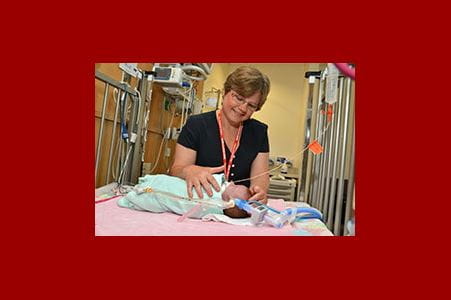By Samantha Ausmus
Physical Therapy Trainee in the Child Development LEND Progam
Development between infants born a few weeks apart can vary greatly. Infants born before 37 weeks are considered premature. Those born 23-28 weeks are considered extremely preterm, 29-33 weeks are moderately preterm, and 37-37 weeks later preterm. In extremely preterm infants, they have fully developed hearing, can respond to sound, pain, and light, and are in the process of developing body fat reserves. The infant is about 12-14 inches long and about 2-4 pounds. Moderately preterm infants have developed visional senses and are beginning to build strength with kicking. Their internal systems are well developed, yet their lungs are still immature. The infant is about 18 inches long and weighs about 5 pounds. In later preterm, the lungs are close to full development, reflexes coordinated, and the infant can now respond to touch. However, in the last few weeks of development, the area that controls thinking in the brain doubles in size. At 35 weeks, the infant's brain only weighs 2/3 of what it will weigh by week 40. Due to the majority of brain development occurring in the last few weeks of pregnancy, premature infants have less mature central nervous systems. Due to lack of maturity, the system can easily be overstimulated by noises, light, and touch. Therefore, the safe environment of the NICU can quickly become overwhelming.
So why is physical therapy vital in the NICU? Brain development depends on genes and environmental experiences. Early and appropriate interactions can create context and directly affect neuron wiring in the brain. Due to the vital nature of learning and neuronal connection, therapy interventions/strategies should be carefully modulated. For the infant to make functional progress, it is essential to promote family-centered care. A collaborative partnership between the family and the physical therapist should exist. The relationship will ensure proper education to the family on the infant's needs. It will also allow for a better understanding of the family's needs and their ability to care for the infant. We want to ensure that parents understand and can respond appropriately to the infant’s cues. Focusing on family-centered care also allows us to address the unique needs of the infant and the family. These unique needs can vary greatly between families and the infant. The variability depends on the family’s education level, economic status, and mental and physical capacities of both infant and family. Before the infant leaves the NICU, physical therapists want to promote as much confidence and education to the family as possible. Having a child in the NICU can be very scary and overwhelming. As a result, the family is the primary focus for collaboration and support.
